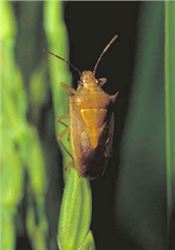Arkansas Gains Use Of Endigo ZC To Battle Rice Stinkbugs

Arkansas has obtained a Section 18 exemption to use Endigo to battle rice stinkbugs. The exemption went into effect Aug. 13 for 15 days.
U of A System Division of Agriculture photo
ROE, ARK.
Arkansas rice growers battling yet another insect in their crops have until Aug. 28 to use Endigo ZC, after the Environmental Protection Agency issued a Section 18 exemption on Aug. 13.
Endigo is currently labeled for use in soybeans, cotton and some specialty crops, but not rice. The exemption will enable rice growers in Arkansas to use the tool to manage rice stinkbugs.
These stinkbugs can cause yield loss by feeding on kernels and can also damage kernels by allowing pathogens to enter the grain and cause discoloration which can reduce milling quality and grade.
Many growers have seen rice stinkbug numbers at threshold for treatment or above for four weeks or more, said Nick Bateman, extension entomologist for the Division of Agriculture.
Last month, University of Arkansas System Division of Agriculture entomologists sought and received a similar exemption for Intrepid to help rice growers manage fall armyworms, which appeared in high numbers to devour the tender leaves in Arkansas rice fields.
With the rice stinkbugs, “there’s been a severe lack of control in the last month and a half with lambda cyhalothrin,” Bateman said.
“We ran some tests last week and saw between 26 and 61 percent control at Altheimer. At Switfon, in northeast Arkansas, we saw between 23 and 70 percent control.
“We are used to seeing 85-90 percent control with lambda cy,” he said.
Extension entomologist Gus Lorenz said “we picked this product for a Section 18 because it had been granted before in Texas. We knew EPA had all the information to move forward with it. We had a conference call with EPA last week and they decided to give us 15 days with this product.”
“We will try to get it extended through the end of the season,” Lorenz said.
Bateman said application rates of 4.5 ounces to 5 ounces per acre have been effective. “Our data is solid on that,” Lorenz said.
Late-planted rice
Even though rice harvest has begun for some, many rice growers had to replant because of severe flooding in June.
“We’re concerned about all the late rice replanted due to the floods,” Lorenz said. “We’ve still got a lot of rice yet to head.”
Lorenz urged growers to “go to the State Plant Board website to download the Section 18 and adhere to the label that’s there. If you make applications, you need to file that the with State Plant Board within 10 days of application.”
Use of product names does not imply endorsement. ∆